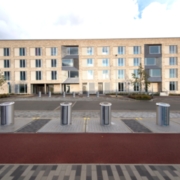Underground refuse bins: A beacon of best practice
The Greater Cambridge Shared Waste Service is working in partnership with the University of Cambridge to launch the largest underground bin system in the UK. Rebecca Weymouth-Wood, Waste Policy, Change and Innovation Manager, spoke to APSE Direct about this bold new initiative
The North West Cambridge Development is being constructed by the University of Cambridge with the aim of reducing the lack of affordable housing for its staff and post-graduate students.
It has been designed to be an exemplar of sustainable development, addressing many areas such as energy, water, materials, and transport amongst others. The minimisation and sustainable management of waste, both through construction and in occupation is one of the key principles applied to the development.
The scheme includes:
• 1,500 homes for University and College staff.
• 1,500 private houses for sale.
• Accommodation for 2,000 postgraduates.
• 100,000 square metres of academic and research and development
• Community facilities such as a primary school, Community Centre, and local shops.
The use of underground bins is an innovative waste disposal method in the UK which assists directly in reducing carbon by taking away the stop-start collection of traditional above ground wheelie bins.
The 150-hectare site, when completed, will benefit from 450 recycling and general waste bins in the form of underground banks placed across 155 locations, eliminating the need for around 9,000 wheeled bins to service the 3,000 homes.
The network of underground bins containing general rubbish, mixed recycling, batteries and paper are located within a short walking distance of all homes.
The waste falls into a large underground chamber, and once installed a sensor will notify the Council when it is full, so that collections need only take place when needed. A specialist lorry then hoists the container out of the ground with a crane and empties the waste into the vehicle.
To date there are 100 bins servicing 630 residents. Collections have gone well since the first bins were commissioned in June 2017, with no contamination issues reported.
The level of recycling so far is promising with dry recycling rates running at 34%. This is 12% higher than the Councils dry recycling rates for the same period. The Council’s Customer Contact Centre has not received any missed bin calls or queries from residents about how the service operates so far and this is positive in terms of resourcing the service.
Residents benefit from the reduced visual impact of the bins (one underground bin replaces around 20 wheeled bins), not having to store or move wheeled bins, or remember when and which bins to put out for collection. The system is embraced, not tucked away, but integrated.
The Council is not reliant on residents’ co-operation to put out bins, and since one operative replaces a crew of three, staffing costs are reduced. There is also less manual handling of containers, reducing potential H&S problems for the operative.
Page 1 of 2 >


.png)



.png)